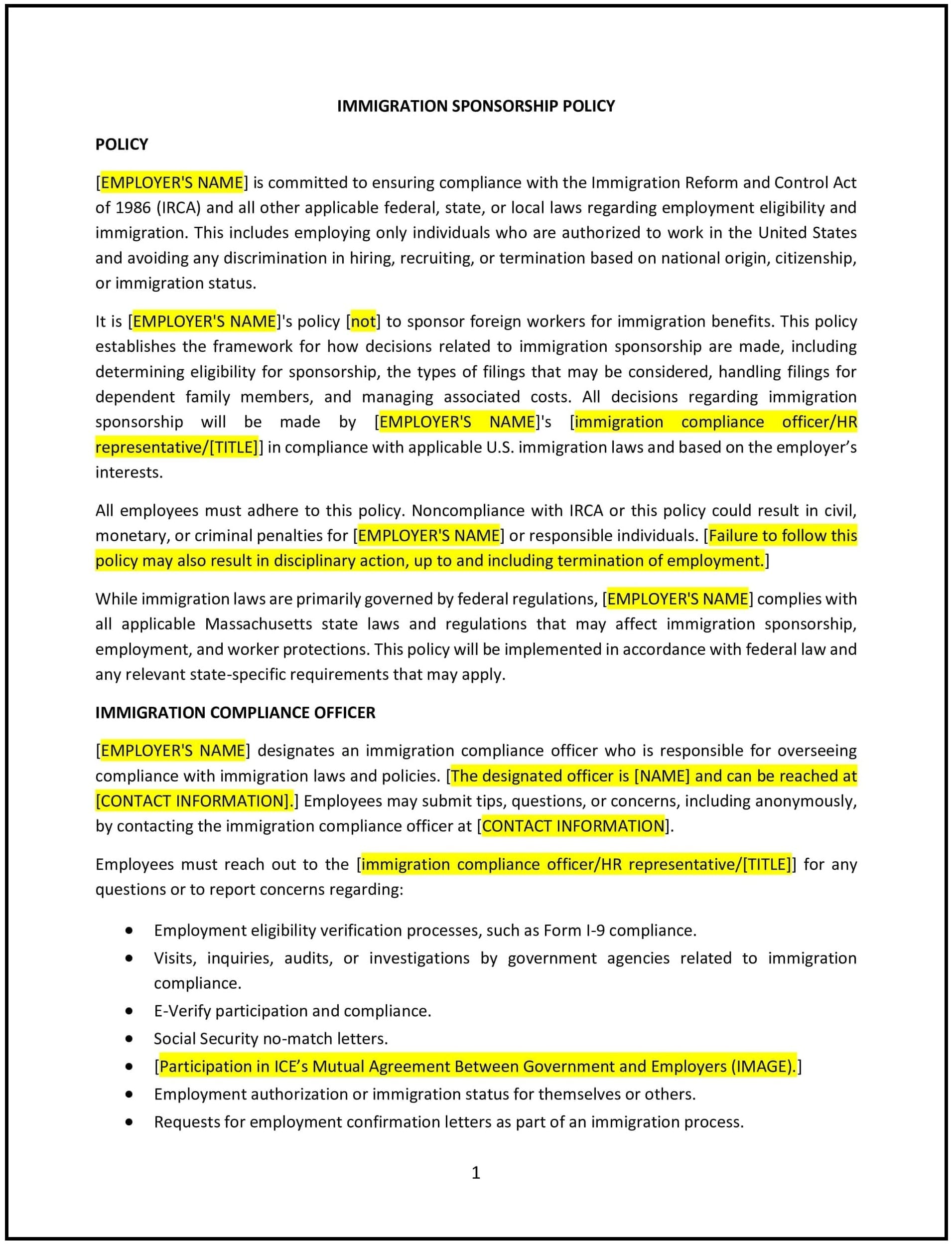Immigration sponsorship policy (Massachusetts): Free template
Got contracts to review? While you're here for policies, let Cobrief make contract review effortless—start your free review now.

Customize this template for free
This immigration sponsorship policy is designed to help Massachusetts businesses outline their approach to sponsoring foreign nationals for work visas and permanent residency. The policy provides guidance on when the company will consider sponsorship, the types of visas the company is willing to support, and the process for requesting sponsorship. It also addresses the company’s commitment to complying with all relevant federal and state immigration laws.
By adopting this policy, businesses can ensure that immigration sponsorship is handled fairly, legally, and transparently, helping them attract a diverse pool of talent and support international employees.
How to use this immigration sponsorship policy (Massachusetts)
- Define the scope of sponsorship: Clearly outline which types of immigration sponsorship the company will support, including work visas (e.g., H-1B, L-1, TN) and permanent residency (green card) sponsorship. The policy should specify which roles or positions are eligible for sponsorship based on the business’s needs.
- Establish eligibility criteria: Specify the criteria for eligibility for immigration sponsorship. This may include the position type, the qualifications of the candidate, and whether the business is able to demonstrate a need for the employee’s specialized skills.
- Set the process for requesting sponsorship: Outline the steps employees must take to request sponsorship, including the initial request procedure, necessary documentation, and how employees should inform HR or management of their sponsorship needs.
- Define company responsibilities: Clarify the company’s responsibilities in the sponsorship process, such as filing visa petitions, covering legal fees, and ensuring compliance with immigration regulations. The policy should also specify the company’s support during the employee’s visa application and renewal processes.
- Outline employee responsibilities: Specify what the employee is responsible for during the immigration process, such as providing necessary documentation, maintaining legal status, and complying with visa requirements.
- Address sponsorship renewal and extensions: Detail the company’s approach to visa renewals and extensions, including the steps that employees and the company must take to ensure continued legal work authorization.
- Comply with federal and state immigration laws: Ensure that the policy complies with all applicable immigration laws, including federal regulations set by the U.S. Citizenship and Immigration Services (USCIS), the Department of Labor (DOL), and state-specific immigration guidelines.
- Review and update regularly: Periodically review and update the policy to ensure it is compliant with changes in federal and state immigration laws, as well as the company’s evolving sponsorship practices.
Benefits of using this immigration sponsorship policy (Massachusetts)
This policy offers several benefits for Massachusetts businesses:
- Expands talent pool: By offering immigration sponsorship, businesses can access a broader talent pool, including highly qualified foreign nationals who can fill specialized roles or address skills shortages.
- Complies with legal requirements: The policy helps businesses ensure compliance with federal and state immigration laws, reducing the risk of fines, penalties, or legal complications associated with hiring foreign workers.
- Promotes diversity and inclusion: By sponsoring employees from different backgrounds and nationalities, businesses can foster a more diverse and inclusive workplace, benefiting from diverse perspectives and experiences.
- Enhances company reputation: Companies that support immigration sponsorship are seen as progressive and inclusive, which can enhance their reputation and make them more attractive to top international talent.
- Retains skilled employees: Providing sponsorship can help businesses retain talented foreign workers who might otherwise be unable to remain in the country, improving employee retention and loyalty.
- Increases global competitiveness: Sponsoring foreign talent allows businesses to remain competitive on a global scale by ensuring they have access to the best talent, regardless of nationality.
Tips for using this immigration sponsorship policy (Massachusetts)
- Communicate the policy clearly: Ensure that all employees are aware of the immigration sponsorship policy, including which positions are eligible for sponsorship and the process for requesting sponsorship. This can be communicated through employee handbooks, internal communications, or during onboarding.
- Offer guidance on the process: Provide employees with guidance on the sponsorship process, including the documentation they will need to provide and any legal requirements they must meet. Consider providing a designated point of contact within HR for employees to reach out to for assistance.
- Maintain legal compliance: Regularly monitor changes to immigration laws and update the policy as necessary to remain in compliance with federal and state regulations. The company should work closely with legal counsel to ensure all documentation and filing procedures are correct.
- Be transparent about timelines: Set clear expectations regarding the timeline for the sponsorship process, including how long it will take for visa applications to be processed, what employees should do during the waiting period, and the steps for renewal or extension.
- Monitor sponsorship statuses: Keep track of employees’ visa status and work authorization expiration dates to ensure timely renewal or extension applications. This can help prevent work authorization lapses and ensure compliance with immigration laws.
- Review and update regularly: Periodically review and update the policy to reflect any changes in immigration laws, company needs, or business operations.